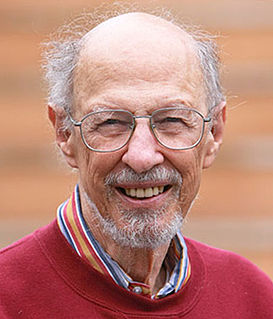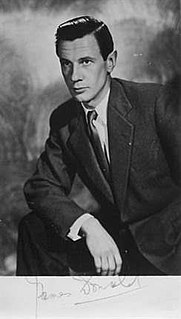A Quote by John Searle
It seemed to a number of philosophers of language, myself included, that we should attempt to achieve a unification of Chomsky's syntax, with the results of the researches that were going on in semantics and pragmatics. I believe that this effort has proven to be a failure. Though Chomsky did indeed revolutionize the subject of linguistics, it is not at all clear, at the end the century, what the solid results of this revolution are. As far as I can tell there is not a single rule of syntax that all, or even most, competent linguists are prepared to agree is a rule.
Quote Topics
Achieve
Agree
As Far As
Attempt
Believe
Century
Clear
Competent
Did
Effort
End
Even
Failure
Far
Going
I Believe
Included
Indeed
Language
Linguistics
Linguists
Most
Myself
Number
Prepared
Proven
Results
Revolution
Revolutionize
Rule
Seemed
Semantics
Should
Single
Solid
Subject
Syntax
Tell
Though
Unification
Were
Related Quotes
I believe that any intelligent person who reads the evidence will come to the same conclusion about 2004 election results . But one will never be able to prove it to an absolute certainty because the votes were never counted in Ohio as the result of an illegal effort by public officials to derail the recount. Even if you do not believe that the election was stolen, there is no dispute that the Republicans made a deliberate, concerted effort to tilt the results in their favor.
Nothing in Chomsky's account acknowledges the difference between intending to kill a child, because of the effect you hope to produce on its parents (we call this “terrorism”), and inadvertently killing a child in an attempt to capture or kill an avowed child murderer (we call this “collateral damage”). In both cases a child has died, and in both cases it is a tragedy. But the ethical status of the perpetrators, be they individuals or states, could not be more distinct For Chomsky, intentions do not seem to matter. Body count is all.
10 Rules for Being Human: Rule #1 - You will receive a body. Rule #2 - You will be presented with lessons. Rule #3 - There are no mistakes, only lessons. Rule #4 - The lesson is repeated until learned. Rule #5 - Learning does not end. Rule #6 - "There" is no better than "here". Rule #7 - Others are only mirrors of you. Rule #8 - What you make of your life is up to you. Rule #9 - Your answers lie inside of you. Rule #10 - You will forget all this at birth.
There are those who argue that the concept of human rights is not applicable to all cultures. We in the National League for Democracy believe that human rights are of universal relevance. But even those who do not believe in human rights must certainly agree that the rule of law is most important. Without the rule of law there can be no peace.
If a mathematician wishes to disparage the work of one of his colleagues, say, A, the most effective method he finds for doing this is to ask where the results can be applied. The hard pressed man, with his back against the wall, finally unearths the researches of another mathematician B as the locus of the application of his own results. If next B is plagued with a similar question, he will refer to another mathematician C. After a few steps of this kind we find ourselves referred back to the researches of A, and in this way the chain closes.








































